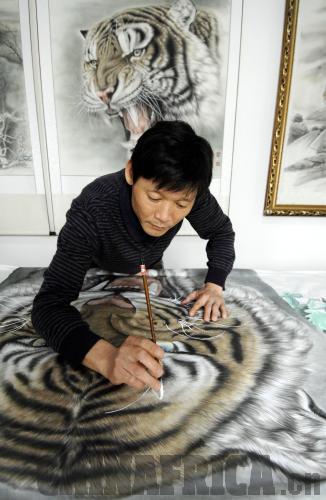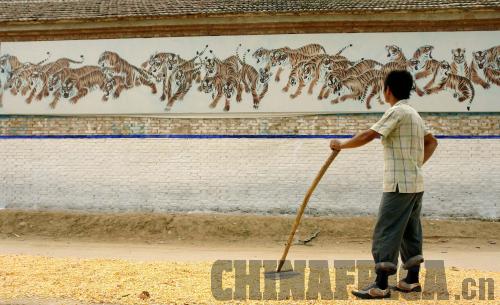|
 |
|
Artist Xiao Yanqing paints tiger in his studio in Wanggongzhuang Village in central China's Henan Province (LI BO) |
Xiao Yanqing, a farmer over 40 years old, could never have imagined that his life could take a different turn when he started painting tigers in the late 1980s. Today, he is known as one of the four tiger painting masters in Wanggongzhuang Village in central China's Henan Province, where the tiger culture and worship originated. He has built his own house, bought a car, and is now leading a better life.
The artist is just one among many tiger painters in the remote village. Today, over 50 percent of the 1,400 inhabitants make a similar living with a "hoe in one hand, brush and ink in the other." Painters are as old as 70, and as young as six. The town has won the name "No.1 Village of Tiger Painting in China."
This village enjoys a long history of painting. "For generations, we mainly lived on farm land, but many families still kept the tradition of painting," said Xiao.
"We are very familiar with the folklore about tigers. The tiger paintings, decorations, shoes and hats can be seen everywhere," he said. For instance, a tiger-shaped pillow is a traditional gift for a newborn baby in Xiao's village, as the animal is considered capable of warding off evils and bringing health as well as blessings.
Boosting rural culture
In 2005, the Chinese Government promulgated the Decision on Further Strengthening Rural Culture Construction, which has made rural cultural development a nationwide priority. Since then, great changes have taken place.
"Many villages have taken on a new look, and farmers are now living a better life compared to 10 years ago," said Pan Lusheng, Member of the 12th CPPCC National Committee, Chairman of the Shandong Federation of Literary and Art Circles and President of Shandong University of Art and Design.
Since 2006, Pan, with his team members, has visited over 200 villages to conduct a research project on rural cultural industry in Shandong Province.
According to research, the arts and handicrafts industry consists of clean economic enterprises, which don't pollute the environment.
Wanggongzhuang sets a good example for bettering rural people's lives through expanding the rural arts and handicrafts industry. "It increases income, which means farmers do not need to seek jobs elsewhere," he said. "It is also creative and artistic."
It is one of the villages that has benefited from the government policies. Especially, the flourishing painting industry has made it take on a new look. The streets and squares are clean, the yards are beautiful and the whole village is green. "All of this can be attributed partly to the tiger painting trade," said Xiao.
 |
|
A farmer looks at a wall painted with tigers in Wanggongzhuang Village of Henan Province (WANG SONG) |
Cashing in
In the early 1990s, Xiao sold seven tiger paintings for 100 yuan ($16) a piece. This caused a sensation in the small village. By the late 1990s, the four tiger painting masters achieved a certain amount of fame. Struggling to satisfy market demand, the masters took on many young people as apprentices to help them produce more paintings. Gradually, the painting industry took shape.
Wang Jianmin, one of the four masters, said he has not done farm work for over 15 years. The artist currently earns over 200,000 yuan ($31,900) every year.
The trade has brought enormous economic returns to local people. In 2012 alone, more than 100,000 tiger paintings were produced and sold at home and abroad, creating a total output value of 60 million yuan ($9.57 million).
Farmers in Shandong Province also increase their income by making handicrafts, including kites, woven products, wood carvings, and Chinese knot handicrafts, according to Pan's research.
For instance, folk artists in Yangjiabu Village in Shandong made over 6.5 million kites in 2009, with a total value of 33 million yuan ($5.26 million). Each artist earned 12,000 yuan ($1,914) on average, which is higher than the average income of farmers - 7,695 yuan ($1,227) - in Weifang City that year.
Statistics also show that the total output value of the arts and handicrafts industry in China has gone beyond 600 billion ($95.7 billion). Nine provinces including Guangdong, Shandong, Zhejiang and Henan are the key production areas.
|